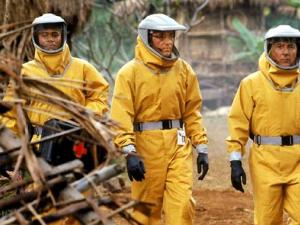http://www.wfaa.com/story/news/heal...an-hospital-ebola-patient-isolation/16460629/
DALLAS A Dallas hospital is holding a patient in "strict isolation" as that person is evaluated for possible exposure to the deadly Ebola virus.*
In a statement issued Tuesday night, Texas Health Presbyterian Hospital Dallas said the patient was admitted based on symptoms and "recent travel history."*
The hospital, located at Greenville Avenue and Walnut Hill Lane in Northeast Dallas, said it is complying with all recommendations from the Centers for Disease Control and the Texas Department of Health to ensure the safety of other patients and medical staff.*
Preliminary results of tests on the patient are expected from the CDC on Tuesday.
DALLAS A Dallas hospital is holding a patient in "strict isolation" as that person is evaluated for possible exposure to the deadly Ebola virus.*
In a statement issued Tuesday night, Texas Health Presbyterian Hospital Dallas said the patient was admitted based on symptoms and "recent travel history."*
The hospital, located at Greenville Avenue and Walnut Hill Lane in Northeast Dallas, said it is complying with all recommendations from the Centers for Disease Control and the Texas Department of Health to ensure the safety of other patients and medical staff.*
Preliminary results of tests on the patient are expected from the CDC on Tuesday.











